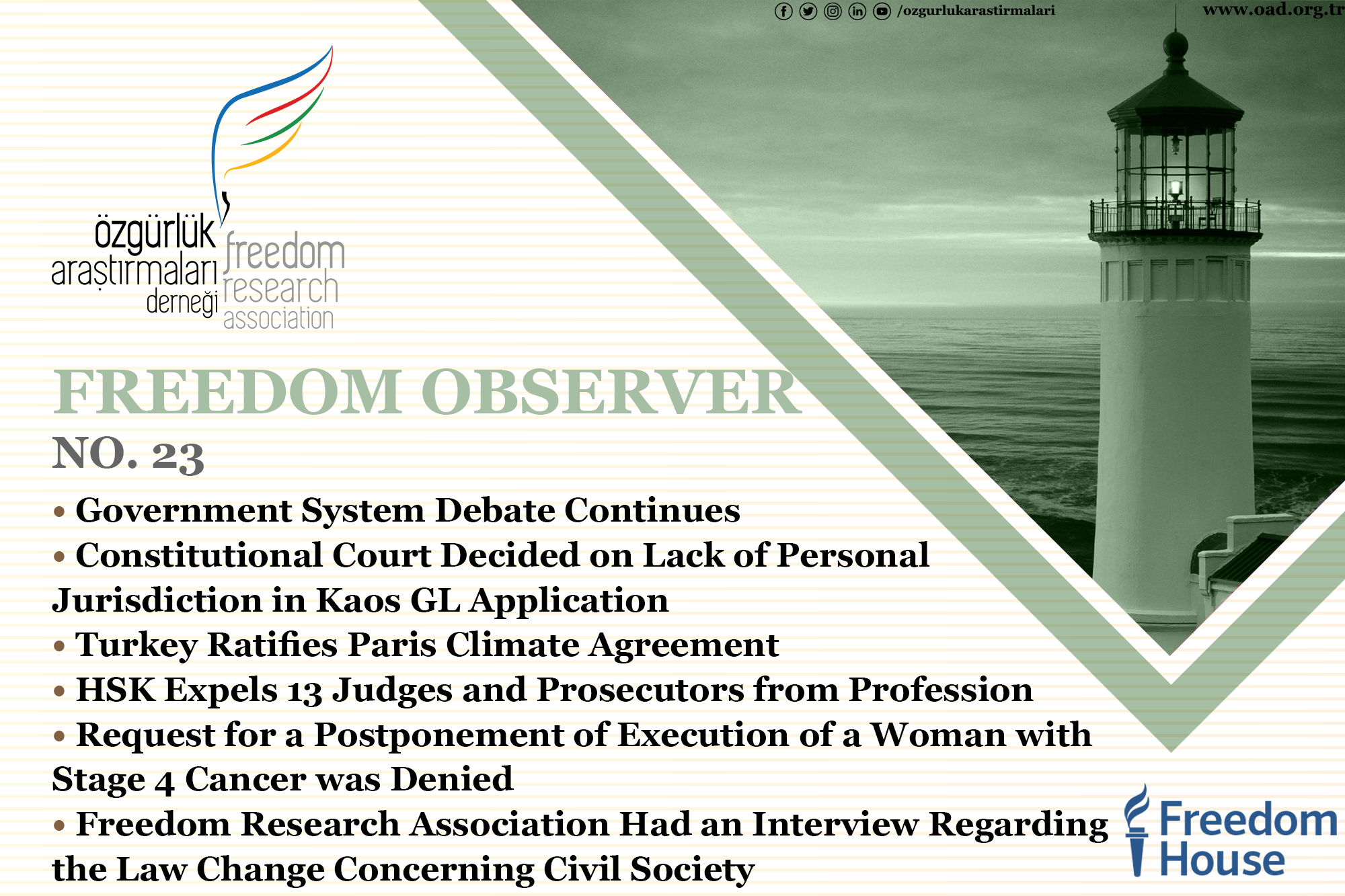From Editor-in-Chief
The search for a new government system continues. As expected, the presidential system introduced with the constitutional revision in 2017 reinforced the one-man rule and oppressive character of the political regime. Far from leading to an effective administration, contrary to what its supporters claimed, the presidential system further increased the number and severity of the country’s problems. This situation has encouraged new searches not only on the side of political parties but also in the civil society in the government system for a long time. As it will be remembered, the Freedom Research Association published a study the last spring that addressed the issue of the political regime and the government system in detail and made concrete suggestions.
In recent days, opposition parties represented in the parliament have come together and started work on an alternative government system model. Opposition parties seem to have agreed on a model they call a “reinforced parliamentary system”. It is understood that the main elements of the model will be strengthening the legislature, an impartial president, and an independent and impartial judiciary. It is hopeful that an independent and impartial judiciary constitutes one of the main points of the new proposed model. However, as the details of the proposed model are not yet clear, it is too early to make a definitive judgment on this initiative of the opposition. On the other hand, there are cases where the opposition’s performance was quite disappointing. For instance, the last decision of the Council of Judges and Prosecutors (HSK), which raised suspicion that the opposition cooperated with the ruling parties in the unlawful dismissal of 13 judges and prosecutors, is particularly confusing in terms of the attitudes of the CHP and İYİ Party. It was, indeed, unforgivable that these parties, which claim to bring back an independent and impartial judiciary, remained silent about the arbitrary dismissal of the judges and prosecutors that is reminiscent of the state of emergency regime. As if that were not enough, the fact that the representatives of the opposition in the HSK cooperated with the representatives of the government in the latest unlawfulness, which was expressed in the wholesale application of this regulation to 13 judges and prosecutors without any concrete justification, constitutes an utmost inconsistency.
On the other hand, we do not encounter any inconsistency or hesitation in the actions of the ruling parties at all. As a matter of fact, not a day goes by where we do not encounter new incidents that show that the AKP-MHP bloc continues the policy of persecution they have been implementing for a long time. Most recently, a woman with stage 4 cancer was denied in her request for a stay of execution. This incident, along with others we have witnessed before, shows that the frequent violations of rights and other arbitrary practices in the execution of sentences and the implementation of detention measures have become a systemic problem that needs to be urgently addressed.
Meanwhile, while there has been a general trend towards improvement in the case-law of the Constitutional Court, it is also the case that the Court has not been able to adopt a determined “rights-based” attitude in some individual applications or cases. Unfortunately, the court’s decision of lack of personal jurisdiction in the Kaos GL application confirms our judgment.
Government System Debate Continues
In the 2017 referendum, Turkey shifted from a parliamentary system to a “presidential system” called the presidential government system. This system which emerged in line with the demands of the opposition parties, AKP and MHP and was accepted by the public with approximately 52 percent, continues to be criticized for concentrating power in the hands of a single person and rendering the TBMM dysfunctional. In the last three years, contrary to its supporters that defended this system on the basis of quick decision making and implementation, we have witnessed those wrong decisions are taken quickly in many areas, especially in the economy.
Opposition parties often argue that this system needs to be changed. İYİ Party Chairman Meral Akşener’s statement that she will not be a candidate for the presidency in that she will return to the parliamentary system and that she aspires to lead the country as the prime minister brought the government system discussions back to the agenda.[1] Although President Erdogan does not seem to have given up on the presidential system[2], opposition parties seem to have reached a consensus to return to the parliamentary system. In fact, the return to the parliamentary system seems to be the only political goal agreed upon by the opposition parties. In this direction, six opposition parties, which have deputies in the parliament, came together and started to work on a “reinforced parliamentary system”.
It is expected that the parties will first submit separate proposals for the new government system and then agree on a joint text. Although we have yet to know exactly what kind of system proposal will emerge, it is foreseen that the themes such as “strong parliament, impartial president and independent and impartial judiciary” will be the crucial ones.[3] The new government system is envisaged to bring back the regulations such as interpellation, verbal question and vote of confidence, which were abolished with the change in the government system into a presidential system, through the amendments to be made in the constitution and the parliamentary bylaws. Although it is not certain that the opposition parties will win 360 seats in the TBMM in the 2023 elections and submit the constitutional amendment to the referendum, the fact that these parties come together and work on a more democratic government system promises hope for the future of democracy in Turkey.
Constitutional Court Decided on Lack of Personal Jurisdiction in Kaos GL Application
On November 18, 2017, the Ankara Governor’s Office decided to ban the activities of some non-governmental organizations, including Kaos GL. The decision of the governor’s office was based on the justification that “it will openly incite a section of the people with different characteristics in terms of social class, race, religion, sect or region to hatred and enmity against another section”. Upon the rejection of the annulment lawsuits filed later, KAOS GL association made an individual application to the Constitutional Court in 2018. On February 21, 2019, the Ankara Regional Administrative Court canceled the administrative action. At the end of this long process, in September 2021, the Constitutional Court examined the application of the association and gave a decision of lack of personal jurisdiction. With this decision, the Constitutional Court continued its passive stance, especially on “threatening” (!) issues, and ignored the violation of rights.
The Constitutional Court asserts that the Kaos GL Association was not affected by the ban decision in a concrete manner. However, the Association did not engage in any activity for about two years after the Ankara Governor’s ban. How is it possible that the Association, whose activities are banned and therefore cannot participate in any meetings or demonstrations, is not affected concretely? The Constitutional Court states that since the Regional Administrative Court canceled the administrative action, the unjust suffering disappeared, and therefore it gave a decision of lack of personal jurisdiction. Well, in this case, how can we explain the suffering experienced over the past two years? As a matter of fact, there is no provision in the decision of the Regional Administrative Court to remedy the two-year violation of rights. If we accept that the annulment of the administrative action eliminates the violation of rights, this situation will turn into a systematic treatment in which the administration constantly violates rights, which will result in the fact that the victims will be worn out in the long litigation processes and they will be deprived of their fundamental rights.
Turkey Ratifies Paris Climate Agreement
The United Nations Framework Convention on Climate Change and the Paris Agreement, which regulates the measures to be taken against the effects of climate change and global warming, was approved by the President on 07.10.2021 with an attached statement based on the Approval Law No. 7335 dated 06.10.2021.[4] The approval decision was published in the Official Gazette (repeated) dated 07.10.2021.[5] In the supplementary declaration, Turkey announced that it would implement the Paris Agreement on the basis of “equity, common but differentiated responsibilities and corresponding opportunities”, without prejudice to the right to economic and social development, in the status of a developing country. The agreement aims to keep the global average temperature rise at a maximum of 1.5 degrees above pre-industrial levels in order to reduce the risks of climate change. To this end, it envisages increasing the ability to adapt to the effects of climate change without threatening food production, promoting climate-resilient, low-emission development, and aligning finance flows with the goal of low greenhouse gas emissions.
It is essential that Turkey determines and implements its development policies in line with the principles and objectives envisaged in the Agreement, in order to leave a livable world for future generations. Indeed, more important than the ratification of the Paris Agreement is its implementation.
HSK Expels 13 Judges and Prosecutors from Profession
With the decision numbered 2021/726 published in the Official Gazette dated 5 October 2021, the Board of Judges and Prosecutors expelled 10 judges and three prosecutors on the grounds of liaison or affiliation with terrorist organizations. The authority to dismiss judges and prosecutors on the grounds that they have liaisons and ties with terrorist organizations and determined to be operating against state security without relying on a concrete action stated in the Decree-Law No. 667 issued during the state of emergency was extended or three years after the end of the state of emergency by the Law No. 7145 and the temporary article No. 35 added to the Decree-Law No. 375. The annulment lawsuit filed at the Constitutional Court against the law, which was applied many times during this period, has yet to be finalized despite the expiry of the law. The duration of the law was extended for another year with Law No. 334 in July 2021.
In the first dismissal decision made after the change of HSK members in June 2021, it is seen that the procedural deficiencies in the previous Board decisions continued. In the elections held in the TBMM in May, seven members of the HSK were elected by consensus of the political parties included in the People’s and Nation alliances, and four members were determined by the People’s Alliance parties, and three members by the Nation Alliance parties.[6]
The concrete actions of the dismissed judges and prosecutors, which might have led to their dismissal, were not included in the new decision, which was taken unanimously by 12 members other than the Minister. Moreover, justification for dismissing judges and prosecutors was not individualized for each judge and prosecutor, and only a collective justification was used. Considering that three members of the HSK were elected from among the candidates supported by the opposition parties, the absence of any opposition votes in the dismissal decision is, indeed, worrisome for the future in terms of eliminating outright unlawfulness.
Request for a Postponement of Execution of a Woman with Stage 4 Cancer was Denied
While complaints and concerns about the prison conditions of sick convicts and detainees continue, Ayşe Özdoğan, who has stage 4 cancer and stated that she cannot continue her treatment under prison conditions and cannot meet her needs on her own, was arrested in the past few days.[7] It is stated that Özdoğan was diagnosed with Maxciller sinus cancer two years ago, and her left upper jaw, teeth, cheekbone, and salivary glands were removed and she is stated to go through four more operations.
It is stated that the charges against Özdoğan, who was sentenced to 9 years and 4 months on the charge of “membership of an armed terrorist organization”, are being an administrator in a private student dormitory, having an account at Bank Asya, membership in an association and using the Bylock messaging program. Özdoğan’s husband, who is a teacher, was also dismissed from public service on the charge of “membership in an armed terrorist organization” and was arrested and sentenced to 13 years in prison.
Freedom Research Association Had an Interview Regarding the Law Change Concerning Civil Society
Within the scope of the Rule of Law and Democracy Monitoring Project in Turkey, Freedom Research Association, with the support of Freedom House, planned a series of interviews to record the administrative and political problems experienced by the Turkish civil society after nine months passed on the “Law on the Prevention of the Proliferation and Financing of Weapons of Mass Destruction”, and to conduct advocacy activities based on our results reports. The first of these meetings was held with a local women’s rights association.
– Within the scope of the law enacted in Turkey, some administrative measures can now be applied to non-governmental organizations without any legal penalties. What do you think about these new sanctions?
“With this law, we started to have serious concerns about whether our association would be harmed because of our political identities. Even though our association is only one year old, we have put in a lot of effort. Now, people with opposing views block themselves in membership applications and delay their membership, or we end up saying, “Let’s deal with your membership later,” because of our concerns. As you very well know that it is very easy to be marginalized in Turkey. Almost anyone can be labeled as a terrorist. In many countries, civil society gives direction and engages in policy-making. But we have the opposite in Turkey; If you are working in a different direction, you become a direct target. We are also working on this concern. Because the work we want to do as a women’s association is to fight violence against women and to highlight gender equality in society. The women who applied to us and received help this year expressed their satisfaction with the existence of such an institution. We are moving more cautiously and slowly so that we can ensure the continuation of this institution that they are satisfied with. Most of the time, we have to hold back from the actions and activities we want to do. With this law and new sanctions, we are constantly alert and worried.”
– One of the main problematic aspects of the law is the very broad definition of “terrorism” in Turkey. According to the latest legislation, the allegation of making propaganda for a terrorist organization is considered sufficient by the public administration to shut down NGOs.
“Terrorism is interpreted broadly in Turkey. Particularly for women’s NGOs, we are trying to create an alternative to gender roles accepted in society. So, this means that we’re trying to get out of the system. This makes it easier for us to be marginalized and terrorized. We think that with this law, the women’s movement has also been narrowed and pushed into fear.”
– Have you been inspected after Law No. 7262 came into effect? Also, Can you please share your experience with us?
“Yes, it was the first audit of our association and it lasted two days. They called us in advance and asked us to bring a set of documents. But since most of us do not know about official documents, it took us a week to prepare the requested documents. Our procedures at the governor’s office took only two days.
I’m an accountant. If the inspection had taken longer, I would have had to spend more time preparing the required documents or gathering the necessary information. This would prevent me from doing my own paid work. Likewise, it was inevitable that our members, who are lawyers, would have to spend more time and would likely experience difficulties in their own workplaces. The administrative burden that increases with the inspection processes increases the work of the association that we carry out voluntarily, which, in turn, threatens the routine of our professions for which we earn our money. Moreover, we do not have the corporate budget to pay if we are fined. As a local association, we do not have professional staff. If this administrative burden continues to increase in this way, the work of our association, which many women are happy to receive support, will be in jeopardy.
[1] https://www.ensonhaber.com/politika/meral-aksener-basbakan-adayiyim
[2]https://www.dunya.com/gundem/erdogan-baskanlik-sistemiyle-yolumuza-devam-edecegiz-haberi-635235
[3] https://www.bbc.com/turkce/haberler-turkiye-58815115
[4] https://www.resmigazete.gov.tr/eskiler/2021/10/20211007-7.pdf
[5] https://www.resmigazete.gov.tr/eskiler/2021/10/20211007M1-1.pdf
[6] https://tr.euronews.com/2021/05/20/hsk-secimleri-7-uyenin-4-unu-cumhur-3-unu-millet-ittifak-sececek; https://www.turkiyegazetesi.com.tr/gundem/791087.aspx
[7] https://tr.euronews.com/2021/10/02/kanser-hastas-ayse-ozdogan-tutukland





